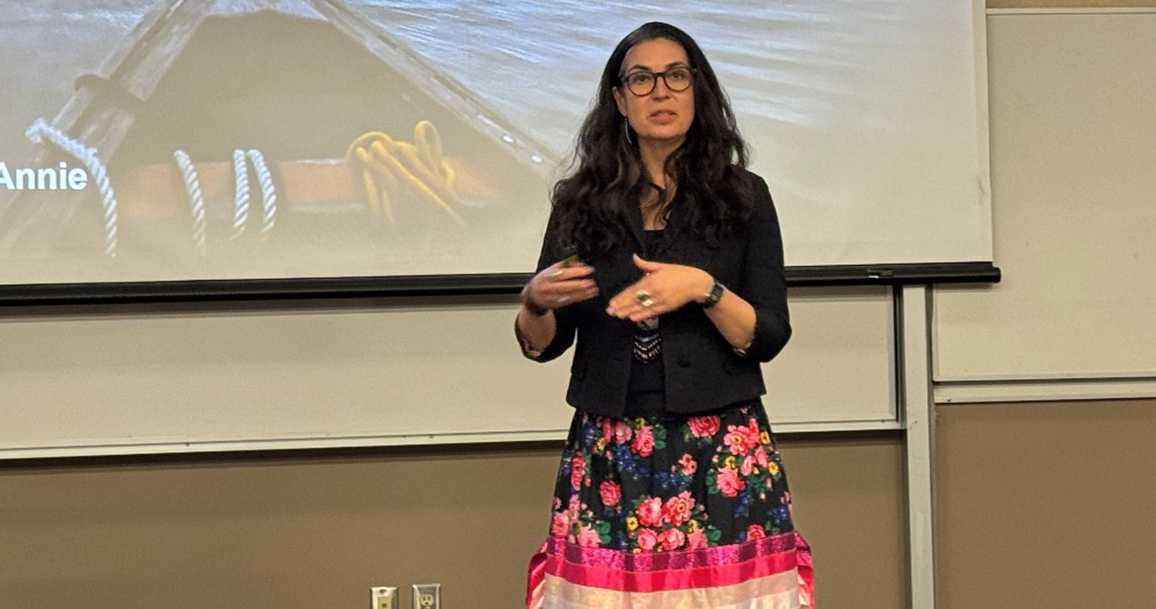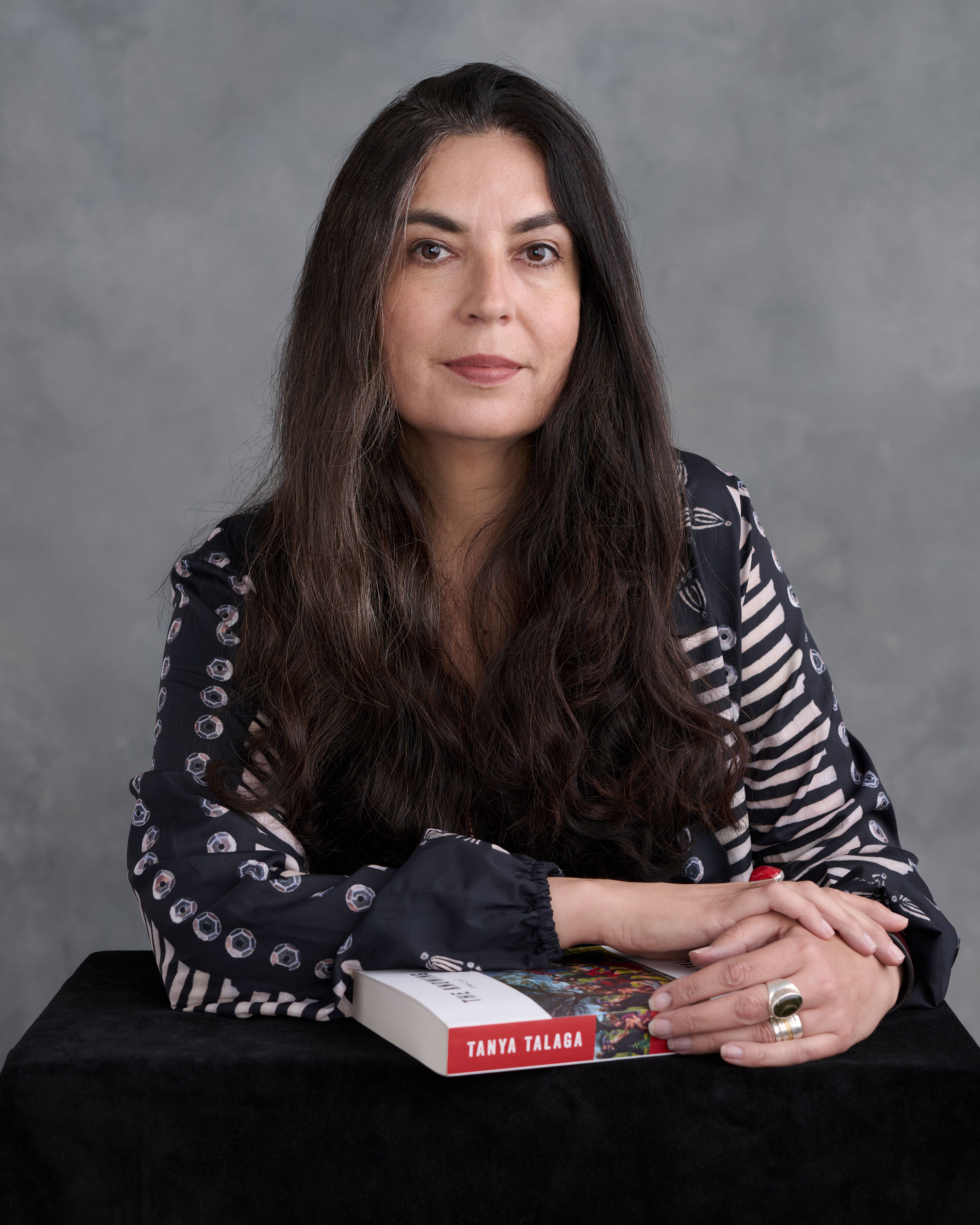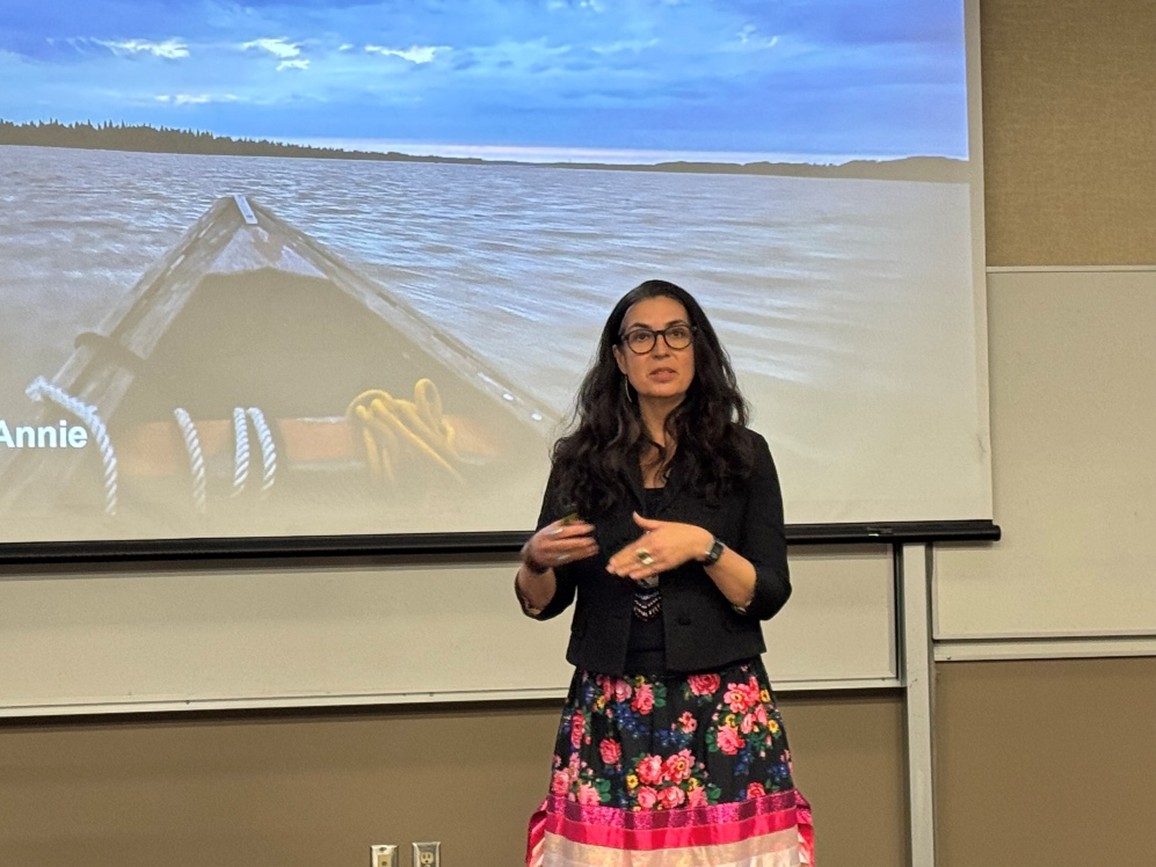
Uncovering the Knowing: A Personal Journey Through History, Family, and Truth
As part of our recognition of the U of R’s 50th Anniversary and the 150th anniversary of the signing of Treaty 4, the Faculty of Education recently welcomed award-winning Anishinaabe author and journalist Tanya Talaga for a powerful public lecture—a presentation that retells the history of Canada as only she can, through the life of her great-great-grandmother Annie Capenter and her family. Talaga unravels the centuries-long oppression of Indigenous peoples—a legacy that continues to reverberate in these communities today.

Talaga is a born storyteller of Anishinaabe and Polish descent. She is a proud member of Fort William First Nation in the Robinson-Superior Treaty territory, and her maternal family has ties to Treaty 9.
Talaga is passionate about education reform and building a more inclusive and equitable future. Known for her books Seven Fallen Feathers and All Our Relations, her work shines a light on the enduring legacies of colonial violence. In her latest book, The Knowing, she takes readers deeper, into her own family history.
The Call to Kamloops
Talaga was contacted by Racelle Kooy, then acting media relations coordinator for Tk'emlúps te Secwépemc, a First Nation in the southern British Columbia that is also home to the former Kamloops Indian Residential School. Kooy informed her of the discovery of what were believed to be the unmarked graves of 215 children at the site.
“I dropped everything,” Talaga recalled. “I booked a flight. I knew I had to be there.”
Upon arrival, she joined survivors around a sacred fire behind the old school building. There, she heard the stories never captured in official records—stories held instead in memory, in silence, and in the shared sorrow of loss.
“We call this the knowing,” one Elder told her, a phrase that would later become the title of her next book.
Searching for Annie
After the Kamloops visit, as she listened to stories of children who never returned home, Talaga found herself drawn back to a long-standing request from her mother: to find out what had happened to her great-great-grandmother, Annie. Annie had disappeared from family stories, her daughter Liz never spoke of her, and government records denied her very existence.
Talaga’s great-uncle Hank, a World War II veteran, had kept a file folder of handwritten correspondence with provincial and federal governments. The folder contained letters, marriage records, maps, and Annie’s death certificate, which noted she died in Toronto after being institutionalized.
Determined to uncover the truth, Talaga enlisted the help of archivist Ryan Shackleton. Their efforts led to a discovery in the Canadian census records: Annie Carpenter, age 10 in 1881, attending school along the James Bay coast.
Paula Rickard, a community genealogist and family historian from Moose Cree First Nation, located the record of Annie's first marriage in the archives of St. Thomas' Anglican Church in Moose Factory. Annie married her first husband, Samson, in Moose Factory on October 29, 1888.
With the help of Ed Janiszewski, a former hospital employee, she uncovered that Annie was among 1,511 individuals buried, most in unmarked graves, at the former Lakeshore Psychiatric Hospital site. Annie’s grave lies just off the Gardiner Expressway, one of the busiest highways in Toronto. Talaga had travelled that road more times than she could count, never knowing her great-great-grandmother was buried just beside it.
It is a cruel reality. Annie had been there, all along, since 1937.
In her quest to find Annie, Talaga encountered the many barriers Indigenous people face in accessing records: misspelled names, erased identities, inaccessible archives. But the most profound sources of knowledge, she shared, came not from government files but from within community networks.
It was a Facebook post that connected her with Paula Rickard, who had a family tree of over 13,000 names and immediately recognized the Carpenter family. With her help, Talaga was able to stitch together Annie’s life.
A Colonial Web
Talaga’s search for Annie pulled her into a broader investigation of the historical forces that shaped, and erased, her family’s history. She explored the role of the Hudson’s Bay Company and the colonial fur trade, which operated Rupert’s Land as a massive economic enterprise from 1670 to 1870. Many governors of Rupert’s Land, Talaga noted, were also linked to Britain’s slave trade, exposing the interconnected systems of racial exploitation that underpin Canadian history.
These systems persisted through instruments like the Indian Act, enacted in 1876, five years after Annie’s birth. The Act would govern every aspect of life for First Nations people in Canada, including education, land, identity, and mobility. “Where does a race-based piece of legislation come from?” Talaga asked. “What mentality justifies that kind of power over Indigenous lives?”

The Living Legacy of Treaty
Treaties were never simply about land transactions; they were promises to share, to coexist with respect and mutual benefit. And yet, as Talaga’s investigation revealed, these promises have too often been broken by systems designed to erase Indigenous presence, culture, and memory. Still, the knowledge lives on—in family stories, in community genealogies, in the knowing.
Reflections for Educators
“History doesn’t live in textbooks alone. It lives in the people. It lives in the land. And it lives in the stories we refuse to let disappear.” - Tanya Talaga
Talaga calls educators, scholars, and alumni to honour the truth in our histories and to teach from a place of authenticity and responsibility.
“History doesn’t live in textbooks alone,” she said. “It lives in the people. It lives in the land. And it lives in the stories we refuse to let disappear.”
As we reflect on the 150 years since the signing of Treaty 4, and as we continue to reckon with the truths of residential schools and colonial policies, Talaga’s story reminds us that education is not only about facts—it is also about relationship, reconciliation, and respect.